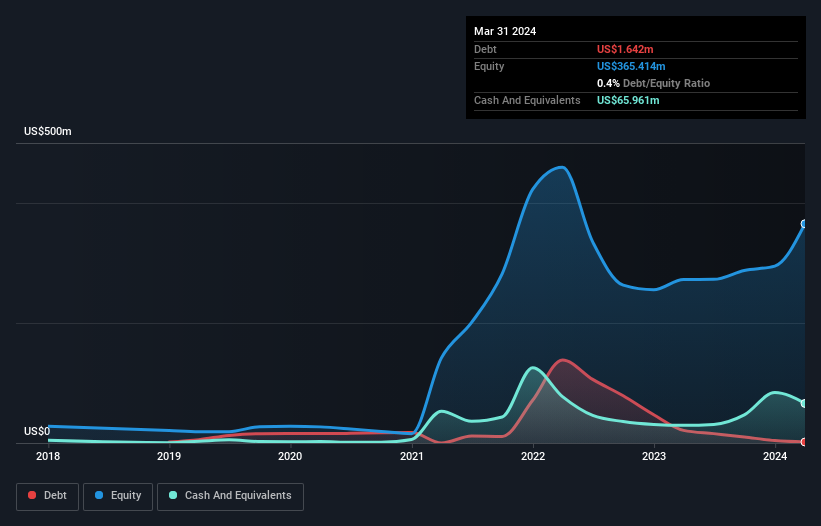Bitfarms (TSE:BITF) Has Debt But No Earnings; Should You Worry?
David Iben put it well when he said, 'Volatility is not a risk we care about. What we care about is avoiding the permanent loss of capital.' When we think about how risky a company is, we always like to look at its use of debt, since debt overload can lead to ruin. We can see that Bitfarms Ltd. (TSE:BITF) does use debt in its business. But the more important question is: how much risk is that debt creating?
When Is Debt A Problem?
Generally speaking, debt only becomes a real problem when a company can't easily pay it off, either by raising capital or with its own cash flow. If things get really bad, the lenders can take control of the business. However, a more usual (but still expensive) situation is where a company must dilute shareholders at a cheap share price simply to get debt under control. Having said that, the most common situation is where a company manages its debt reasonably well - and to its own advantage. The first thing to do when considering how much debt a business uses is to look at its cash and debt together.
View our latest analysis for Bitfarms
What Is Bitfarms's Debt?
As you can see below, Bitfarms had US$1.64m of debt at March 2024, down from US$21.1m a year prior. However, it does have US$66.0m in cash offsetting this, leading to net cash of US$64.3m.

How Healthy Is Bitfarms' Balance Sheet?
According to the last reported balance sheet, Bitfarms had liabilities of US$45.5m due within 12 months, and liabilities of US$15.5m due beyond 12 months. Offsetting this, it had US$66.0m in cash and US$729.0k in receivables that were due within 12 months. So it can boast US$5.63m more liquid assets than total liabilities.
Having regard to Bitfarms' size, it seems that its liquid assets are well balanced with its total liabilities. So it's very unlikely that the US$652.3m company is short on cash, but still worth keeping an eye on the balance sheet. Succinctly put, Bitfarms boasts net cash, so it's fair to say it does not have a heavy debt load! The balance sheet is clearly the area to focus on when you are analysing debt. But it is future earnings, more than anything, that will determine Bitfarms's ability to maintain a healthy balance sheet going forward. So if you're focused on the future you can check out this free report showing analyst profit forecasts.
Over 12 months, Bitfarms reported revenue of US$167m, which is a gain of 26%, although it did not report any earnings before interest and tax. Shareholders probably have their fingers crossed that it can grow its way to profits.
So How Risky Is Bitfarms?
We have no doubt that loss making companies are, in general, riskier than profitable ones. And in the last year Bitfarms had an earnings before interest and tax (EBIT) loss, truth be told. And over the same period it saw negative free cash outflow of US$103m and booked a US$106m accounting loss. Given it only has net cash of US$64.3m, the company may need to raise more capital if it doesn't reach break-even soon. With very solid revenue growth in the last year, Bitfarms may be on a path to profitability. By investing before those profits, shareholders take on more risk in the hope of bigger rewards. There's no doubt that we learn most about debt from the balance sheet. However, not all investment risk resides within the balance sheet - far from it. For example - Bitfarms has 2 warning signs we think you should be aware of.
If you're interested in investing in businesses that can grow profits without the burden of debt, then check out this free list of growing businesses that have net cash on the balance sheet.
The New Payments ETF Is Live on NASDAQ:
Money is moving to real-time rails, and a newly listed ETF now gives investors direct exposure. Fast settlement. Institutional custody. Simple access.
Explore how this launch could reshape portfolios
Sponsored ContentValuation is complex, but we're here to simplify it.
Discover if Bitfarms might be undervalued or overvalued with our detailed analysis, featuring fair value estimates, potential risks, dividends, insider trades, and its financial condition.
Access Free AnalysisHave feedback on this article? Concerned about the content? Get in touch with us directly. Alternatively, email editorial-team (at) simplywallst.com.
This article by Simply Wall St is general in nature. We provide commentary based on historical data and analyst forecasts only using an unbiased methodology and our articles are not intended to be financial advice. It does not constitute a recommendation to buy or sell any stock, and does not take account of your objectives, or your financial situation. We aim to bring you long-term focused analysis driven by fundamental data. Note that our analysis may not factor in the latest price-sensitive company announcements or qualitative material. Simply Wall St has no position in any stocks mentioned.
About TSX:BITF
Bitfarms
Operates integrated bitcoin data centers in Canada, the United States, Paraguay, and Argentina.
High growth potential with adequate balance sheet.
Similar Companies
Market Insights
Weekly Picks

THE KINGDOM OF BROWN GOODS: WHY MGPI IS BEING CRUSHED BY INVENTORY & PRIMED FOR RESURRECTION


Why Vertical Aerospace (NYSE: EVTL) is Worth Possibly Over 13x its Current Price


The Quiet Giant That Became AI’s Power Grid
Recently Updated Narratives


A case for USD $14.81 per share based on book value. Be warned, this is a micro-cap dependent on a single mine.

Occidental Petroleum to Become Fairly Priced at $68.29 According to Future Projections

Agfa-Gevaert is a digital and materials turnaround opportunity, with growth potential in ZIRFON, but carrying legacy risks.
Popular Narratives


MicroVision will explode future revenue by 380.37% with a vision towards success


Crazy Undervalued 42 Baggers Silver Play (Active & Running Mine)





